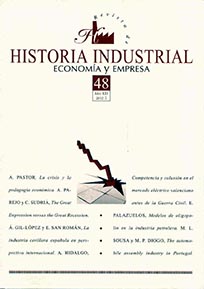David y Goliat. La industria cerillera española en perspectiva internacional (1892-1956)
Palabras clave:
Industria Fosforera, Historia Empresarial, Monopolio, Empresa Familiar, Redes EmpresarialesResumen
Este trabajo estudia la evolución del sector fosforero español, desde sus orígenes hasta 1956, fecha en que el monopolio estatal sobre la fabricación y venta de cerillas fue clausurado. Este monopolio estuvo arrendado durante más de treinta años a una empresa familiar, la Compañía Arrendataria de Fósforos, integrante de un holding empresarial nacido en los años veinte: el Grupo Fierro. Su temprana internacionalización se apoyó en la creación de unas redes empresariales muy valiosas en la España de la autarquía. En la década de 1950 contaba con empresas fosforeras en Portugal, Marruecos y varios países iberoamericanos como Cuba, Venezuela y Ecuador. Desde el punto de vista internacional, el sector ha funcionado como un perfecto cártel, dominado por un número reducido de gigantes industriales que experimentaron un vital crecimiento basado en la integración horizontal y en múltiples acuerdos de colaboración para repartirse el mercado.Descargas
Descargas
Publicado
Cómo citar
Número
Sección
Licencia
El/la autor/a cede los derechos al/la editor/a. Creative Commons
El/la autor/a que publica en esta revista está de acuerdo con los términos siguientes:
- El/la autor/a cede en exclusiva todos los derechos de propiedad intelectual al/la editor/a para todo el mundo y toda la duración de los derechos de propiedad intelectual vigentes aplicables.
- El/la editor/a difundirá los textos con la licencia de reconocimiento de Creative Commons que permite compartir la obra con terceros, siempre que éstos reconozcan su autoría, su publicación inicial en esta revista y las condiciones de la licencia.





